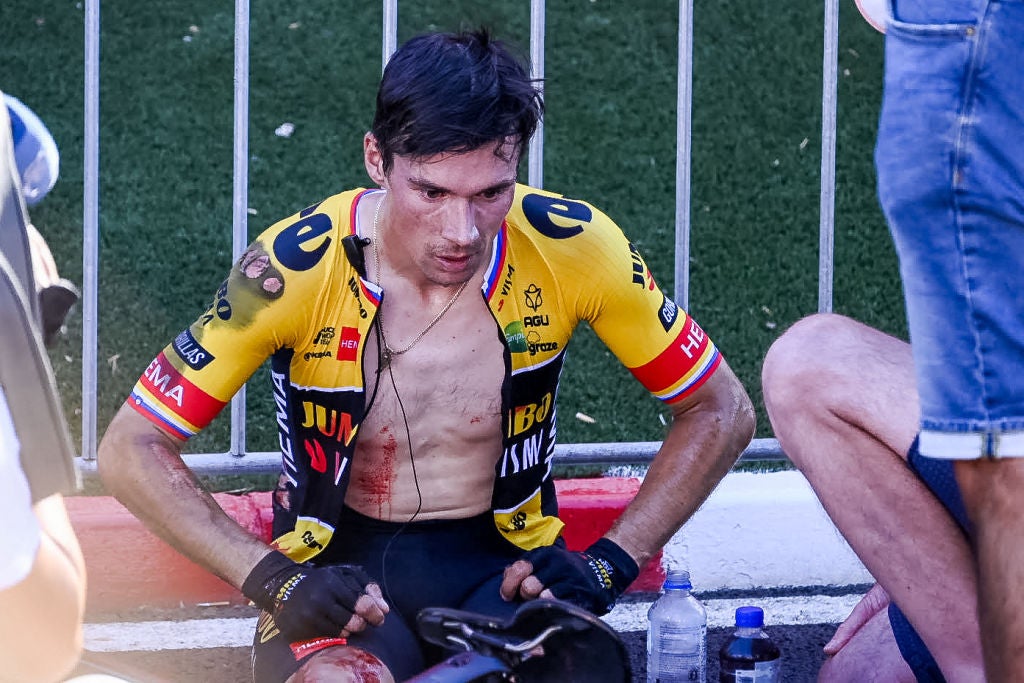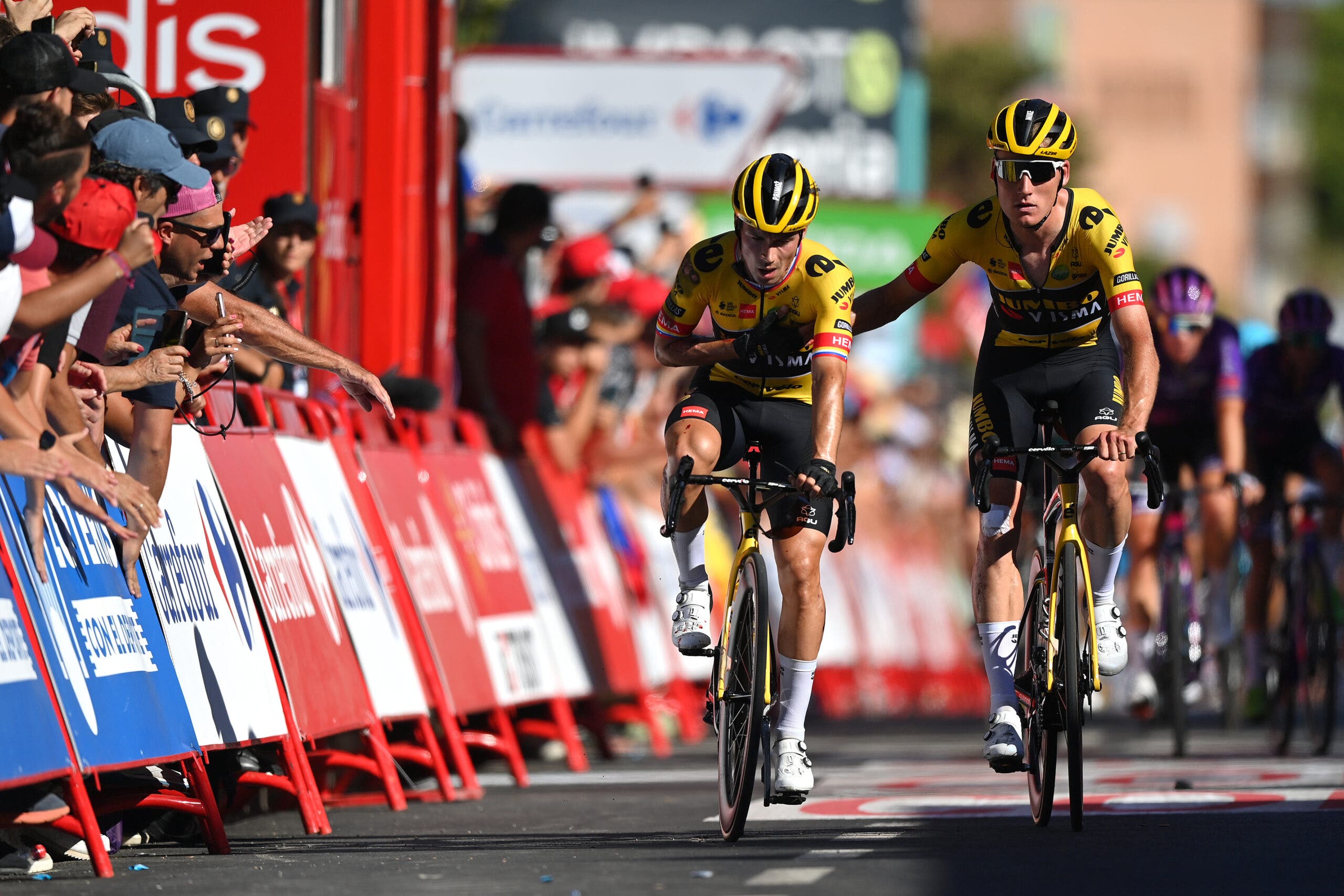Opinion: Jumbo-Visma's PR disaster only puts Primož Roglič in a negative situation

Primoz Roglic sits on the ground after crossing the finish line (Photo: Filip Lanszweert/Belga Mag/AFP via Getty Images)
On Stage 17 of the Vuelta a España, in the final 50 meters, Primož Roglič fell. He initiated a surprise attack and tried to slip into the wake of Bahrain Victorious’ Fred Wright, there was some contact of a disputed variety, and Roglič went down. This fall tore up his skin and his clothes and, defeated, the race’s defending champion decided to withdraw.
At the time, there was a lot of chaos. The incident was analyzed on Twitter and by television commentators over and over again. Race crashes are never a simple matter, and one’s perspective can obviously change depending on who crashed and why, but the general consensus seemed to be that it was an ordinary accident, albeit with extraordinary consequences. A race incident. Even now, this is still the most gracious, fair way of putting it.
Also read:
- Roglič blames Wright for causing him to crash
- No broken bones or concussion, but Primož Roglič leaves Vuelta a España in ‘a lot of pain’
- Primož Roglič abandons Vuelta a España following stage 16 crash
- Primož Roglič crashes hard during finale of stage 16
On the day of the stage, nothing else happened. Neither team approached the commissaires, no other comments were made other than those expressing an outpouring of support for Roglič, whose loss was seen by many as sad for both him and the story of the race. The next day, the Vuelta went on without Primož Roglič.
Then on Friday afternoon, Roglič, and Jumbo-Visma put out an incendiary PR statement blaming Fred Wright for the crash.
“This was not okay”, [Roglič] refers to the collision with Fred Wright, who finished fourth. “This shouldn’t happen. People move on swiftly as if nothing happened. For me, that doesn’t apply. This is not the way I want the sport to continue and I want to make that clear…Not everyone saw it correctly. The crash was not caused by a bad road or a lack of safety but by a rider’s behavior. I don’t have eyes on my back. Otherwise, I would have run wide. Wright came from behind and rode the handlebars out of my hands before I knew it.”
The team added: “We also believe that if a team has certain feelings about an incident on the road, the place to take those up is with the commissaires after the stage rather than a statement online some days later.”
In the end, the point of whether Wright or Roglič caused the crash is ultimately irrelevant as the case was closed in every real sense after the stage ended. The question, though, is why such an incendiary statement was made by Jumbo-Visma in the first place.
To paraphrase a friend of mine who is a doctoral student in media studies, the purpose of marketing – and by extension public relations (or PR) – is to manufacture a new reality. In most cases, that reality is the one in the best interest of the team (aka a business) and by extension its stakeholders, of which fans are also a part. Objectively comparing facts and determining the truth, as well as collecting statements by all riders is where race officials and journalists come in.
This distinction between press and marketing should be fairly straightforward. Yet in cycling, I’ve noticed that there is generally a lack of awareness or literacy regarding the nature or purpose of public relations statements and also the inability to discern between that which is essentially marketing by teams, such as team-filmed documentaries, team-conducted rider interviews and social media posts versus journalism practiced by a free, critical, and open press.
Fans often uncritically take team content at face value and believe that it gives them an intimate look under the hood, granting access to riders’ lives and personalities that they could only have dreamed of a decade ago. No team is as savvy at this kind of content generation as Jumbo-Visma which has had its own full documentary team on the 2019 Vuelta and the last three Tours de France, is deeply involved in creating personal connections between riders and fans through social media, and is proactive about telling their story from the team’s perspective first, thus keeping a tight lid on the team’s personal narrative. It also crafts the kind of fan loyalty other cycling teams could only dream of.
This should come as no surprise considering the fact that Mr. Plugge used to be a journalist himself and is well aware of how public consensus is built and how narratives are crafted in the press. But an uncomfortable pattern of behavior of media control has begun to emerge in the last few years from the Jumbo-Visma tent, of which the Vuelta incident is only the latest and so far the only to backfire.

For example, in 2021, Jumbo-Visma restricted all access to its winter training camp and Tour de France rest day hotel solely to The Cycling Podcast, much to the chagrin of other members of the press. At the end of the Tour this year, it was revealed that they had hired members of the highly popular YouTube and Podcast series Lanterne Rouge as team consultants, which was only disclosed by said consultants after the team had won the Tour, raising questions about conflicts of interest and kicking off a debate about what counts as “journalism.”
After myself and my colleague Jonny Long asked Jonas Vingegaard and Wout van Aert routine questions about defending and explaining their strong performances, the team tweeted pictures of those athletes from its official account with the caption “We promise you these guys are only human,” a statement insinuating – whether intentionally or not –- that journalists were accusing Vingegaard and Van Aert of doping. After this happened, I personally received much of the same kind of fan retaliation and vitriol experienced by Fred Wright.
To address the Vuelta statement itself, as someone who has had nothing but a pleasant and productive working relationship with both Roglič and Jumbo-Visma, I cannot remember a time when Primož ever expressed animosity towards another rider. As I said earlier, he has been one of the peloton’s most gracious losers and this element is key in his repeated stories of devastation and redemption.
Even if Roglič felt that the crash was Wright’s fault and was suitably angry, Jumbo-Visma did him a massive disservice by putting out a statement to that effect, opening the door to a flood of online criticism and abuse towards both riders. By doing this, they did not protect Primož at a time when he is at his most vulnerable. The statement paints Roglič in a poor light contrary to the image the team has historically crafted through its other media products – and by pitting rider against rider, it opens him up to further scrutiny and dislike within the peloton.
Furthermore, Mr. Plugge’s comments about safety are bizarre given the fact that the more obvious time to raise safety concerns was during the Tour when Roglič was taken out by a stray hay bale. It would have been even more effective in last year’s Tour, when concerns about rider safety were at an all-time high, to the point where riders staged a protest of unsafe racing conditions by slowing down stage 4. In all sports, athletes have a common interest in solving safety and other employment issues, often, as is the case in all labor issues, contrary to the interests of management and to race organizers. Mr. Plugge’s assertions directly serve to divide riders and to sow distrust within the professional peloton, encouraging riders to blame one another rather than join together to fix a problem they all face.
Surely Mr. Plugge is aware of the unusually high fan standards for sportsmanship in professional cycling, a sport in which it is considered uncouth, if not outwardly scandalous, for riders to be angry in any respect, a sport which believes that no matter the conflict everyone should shake hands at the end. This is a sport in which no one likes a sore loser. In this respect, to say the statement backfired massively is an understatement.
In all, such a PR statement is baffling at best and tone deaf at worst. Jumbo-Visma has been successful only in starting fan conflicts and causing a huge upset on social media, all at the expense of one of their most valuable assets and the reputation of one of the most beloved athletes in the peloton. One does not know why the team would put Roglič in such a negative situation at a time when he is already smarting from one of his worst losses, or how a team so gifted in PR could make such a massive PR blunder. For now, all that can be said is, in the words of a famous Twitter quip: you hate to see it.